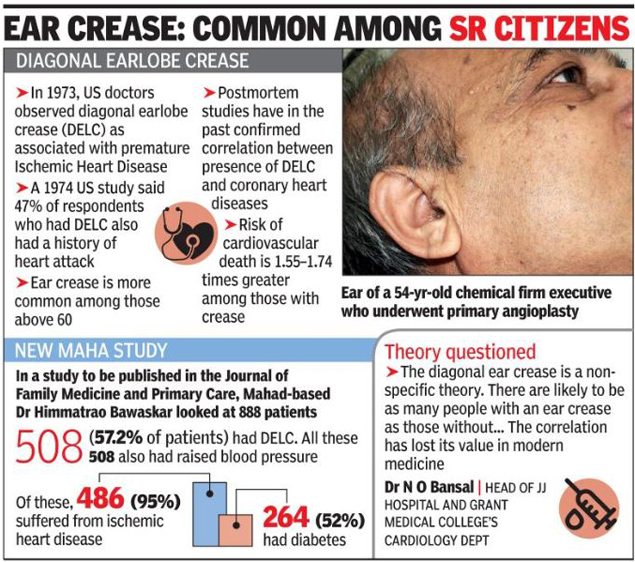A study by Indian Doctor finds; ‘Ear crease may hint at a diseased heart’

India is a country were the heart diseases account for 1.7 million lives annually. Usually, the patients are subjected to undergo several diagnostic tests. This rural doctor wants to revive the bygone art of diagnosing the cardiac problems by merely taking a closer look at the patient.
Dr Himmatrao Bawaskar, who practices in Mahad, which is 160 km away from Mumbai studied 888 patients who came with diseases common among Indians, like diabetes and hypertension. He found that 95% of people who have ear crease had ischemic heart disease. Of the 888 people he studied, 508 had ear crease. Dr Bawaskar says that the diagonal earlobe crease (DELC) is one of the most visible indications of a diseased heart.

But this theory is not new. American Doctor Sanders T Frank “discovered” the ear-heart link in the early 70’s.
Dr Bawasker’s study has been accepted for publication in the Journal of Family Medicine and Primary Care. The study has also found that there is a relation between heart disease and height. In the study, it has been found that men with a mean height of 166.4 cm and women with a mean height of 151.1 cm are more prone to coronary artery diseases. Most of the Europeans are have a height of 180cm or more and have thicker blood vessels making them less prone to the heart diseases. But Indian are shorter and have thinner blood vessels. Dr Bawasker clearly hopes that such surrogate markers can help the rural patients.
Dr Altaf Patel, the former professor from JJ Hospital’s Grant Medical College in Byculla, said, “The earlobe connection to heart disease seems like a common sense thing.” As people grow older and develop blood pressure, the fat tissues curve up to form a crease. “A majority of people with an ear crease are in their late 50s or 60s. Most of them will have high blood pressure or heart disease,” added Dr Patel.
But professor and head of the cardiology department at J J Hospital, Dr N O Bansal has a different opinion. “The correlation has lost its value in modern medicine. People can have the ear crease without heart disease. Moreover, there are diagnostic labs or small hospitals even in remote parts of the country offering ECG to detect heart problems,” he said.
Source: https://timesofindia.indiatimes.com/india/maharashtra-doctor-study-finds-95-with-ear-crease-have-heart-disease/articleshow/65825323.cms